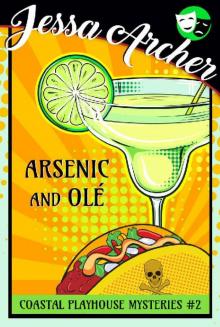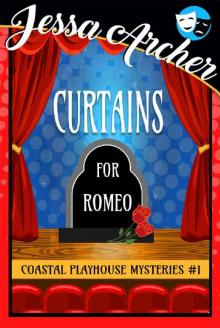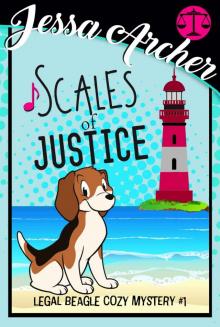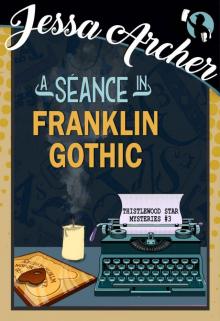- Home
- Jessa Archer
Palatino for the Painter Page 3
Palatino for the Painter Read online
Page 3
“Who found the car?” I asked Ed.
“Two brothers. Tourist kids, down from Ohio for a family reunion. They were trying out some new diving equipment they got for Christmas when they came across the car. At first they didn’t know what they were looking at. It was partially buried in mud and silt. I can get their names from Billy later.”
“So the car has been there a while?” Wren asked.
Ed nodded. “I would say so. They saw the body in the driver’s seat when they went in for a closer look. Nothing left but a skeleton. Still strapped in the seat belt.”
I shivered. It had been there a long time, then.
“Townsend!” Blevins bellowed from the riverbank.
“Oh no,” I whispered in mock horror. “We’ve been discovered.”
Blevins stopped at the sawhorse barrier. His face was red and he was already out of breath. “You need to get your girlfriend out of here, Ed. We don’t need her or her camera making a bad situation worse. And Wren, we really don’t expect you to pick up the body. If the family, whoever it might be, decides they need your services, we’ll let you know.”
Wren gave him a tight smile. The words were benign enough on their face, but we went to school with this guy. Blevins had never liked Wren, even told me that I was making a mistake by hanging out with someone like her. And there are certainly people in Thistlewood who’ve opted to take their recently deceased elsewhere rather than patronize a black-owned funeral home.
I wanted to punch the smug look off the sweaty face that Blevins was wiping with his sleeve. “Start of the tourist season,” he muttered, “and something like this has to happen.”
Ed’s jaw was clenched. “Awful inconsiderate of the driver of that car. Sounds like he planned it all out. Drove smack into the river umpteen years ago just so he could ruin your Memorial Day weekend.”
“I had to laugh at your lame jokes when you were my boss,” he said, “but not anymore. And you need to clear out, too, Ed. You’re a civilian now.”
“Not by choice. And I know this phrase is overused, but it’s a free country, Blevins. We made plans to meet here for a picnic this afternoon, and lo and behold, we find your fancy barricade blocking our access to the river. As far as Ruth goes, I don’t tell her what to do, but her readers have a right to be informed. There’s this little thing you may have heard of called the First Amendment?”
Blevins glared at him for several seconds, then jabbed a finger in my direction. “No pictures of the body.”
“Are we going to do this same song-and-dance routine at every crime scene, Steve? I didn’t take pictures of Edith Morton because it would have been ghoulish. That goes double for a skeleton.”
Blevins rounded on Ed. “You told her that? How did you even know?”
“Come on, Steve. You weren’t exactly using your indoor voice when you were questioning those two kids. I may be older than you, but my hearing is still sharp as a tack, because unlike the guy who now holds my job, I was smart enough to protect my ears during target practice.”
The sheriff ignored him, leaning forward across the barrier. It was definitely his indoor voice this time, because I had to strain to hear his next words. “I don’t have to tell you how important tourist season is, Townsend. You actually have a few readers outside of Thistlewood after your little exposé on the whole Edith Morton drama.”
He was right on that count. In searching for who killed Edith, I had inadvertently uncovered a much older murder. One of the TV stations in Knoxville had even sent a reporter down to cover the story a few days after I published it.
“So you need to tread carefully. Because if you scare off our business this summer, I can promise you that the whole town will be at your throat.” Then he turned away and marched back down to the river.
“Such a pleasant man,” Wren said.
“Indeed,” Ed said. “He’s just a big bundle of sunshine, lollipops, and rainbows.”
“Are the divers still around?” I asked. “The ones that found the car?”
He pointed off to his right. “Jolly’s Campground up the river. Blevins didn’t close it. Although I’m guessing he did tell them to shut down river access.”
“You said it was two kids, earlier. Did you mean kids kids, or older?”
“Older. Probably around Kate’s age.” Kate was his niece, who was a senior in high school. “Although, to be fair, I’m apt to call anyone under thirty a kid these days.”
“Did these kids”—I made air quotes around the word—“already give their statement?”
“Yeah. They left just before you got here. Hiked back up to the main road. Kinda surprised you didn’t see them on your way in.”
“They must have cut through the woods. I didn’t see anyone.”
“Yeah, this area is pretty remote,” he said. “The road is in bad shape, and since they expanded the marina, most people go up there. But we used to come out here to swim when I was a kid, and for…um…private parties when I was a little older.”
“Did you, now?” I asked, giving him a grin. “Anything you want to share?”
“Nope. The main attraction was that it was a little less crowded on Saturday nights than that spot over there.” He pointed upward at a spot above the tow truck.
I squinted my eyes against the bright sun. On the opposite side of the river, about seventy feet up, was a cliff, completely bare of trees.
“Lover’s Leap,” Wren said.
“Oh, yeah,” I said. “I remember that place.”
“Do you, now?” Ed asked, returning my earlier grin. “Anything you want to share?”
“Not in a million years. Do you think the car went off from up there?”
Ed frowned. “You know, I hadn’t even thought of that. But it very well could have. There’s a steel barrier up there now. We put it in when I was sheriff. Nothing especially sturdy—it’s hard to get much into the rock up there without special equipment—but it was still better than the stupid rope they had strung across the edge before that. That rope was barely even enough to remind people where the edge was. But this car has clearly been down there a while, so…” He tilted his head to the side, and I got the sense that he was doing some sort of complicated geometry, trying to calculate where the car might have wound up if it originated from that cliff.
A grinding noise pulled our attention back to the tow truck as the chain was yanked taut and began reeling in its catch. River water dripped from the thick links, and the motor groaned in protest.
I watched the scene from my camera’s viewfinder, snapping pictures in rapid succession. The front of the car rose from the dark water. It was covered in rust and mud, making it almost impossible to tell the original color. The only thing I could really tell was that it was a sedan. An old one. It looked like the headlights were knocked out because you couldn’t even see a reflection. I was actually surprised there wasn’t more damage to the front, given how hard the vehicle must have hit the water.
At first I thought it must be an out-of-state car, because there was a tag on the front, and Tennessee only requires it on the back of the car. As I zoomed in closer, though, I noticed two things. The first was that the headlights weren’t missing. They were just a relic of really bad seventies design on some luxury cars, where a metal eyelid closed over the light.
Second, what I’d thought was an out-of-state tag was a novelty tag. It looked like a normal Tennessee plate, but directly below the header were the words B TYLER.
The camera fell from my hands. It bounced against my chest instead of crash-landing on the ground, thanks to the strap. The day felt suddenly cold, like it was midwinter instead of late May.
“Ruth?” Ed said. “Honey? What’s wrong?”
Wren’s voice was calling my name, but it was like they were both inside a tunnel.
As the car rose from the water, I couldn’t take my eyes off the novelty plate. Wren and I had crouched down next to the proud new owner of that rickety old Mercury Marquis Brougham thi
rty-three years ago as she attached that tag to the bumper.
“Oh my God, Wren,” I said quietly. “It’s Tanya’s car.”
✰ Chapter Three ✰
My hands shook all the way back to town. Wren had asked if I wanted her to drive, but I’d told her I was fine, mostly because she didn’t look like she was in any better shape than I was.
B TYLER. How many times had the three of us driven around town in that old Mercury belting out “Total Eclipse of the Heart” at the top of our lungs? Tanya had always taken lead, since she had the same raspy quality to her voice as Bonnie Tyler. Wren handled the background vocals, and I did whatever I could to harmonize with them. I never was much of a vocalist, but any good karaoke singer worth his or her salt will tell you it’s all about the spirit. And all three of us had spirit.
Everyone knew Tanya had big dreams. They’d heard her sing at talent shows and listened to her belt out the national anthem at the high school football games since she was in elementary school. So the rumor that she’d skipped town and headed for the brighter lights of the big city, it took hold quickly. It was the talk of the town for about a week, with everyone predicting that Tanya Blackburn would come strolling into town one day with a record deal and her voice blasting out of the radio. Wren and I, however, were telling anyone who would listen that it wasn’t true. What made me truly crazy was that we couldn’t even get Tanya’s parents to believe us. They’d always seemed kind of distant, too wrapped up in their own lives to worry much about Tanya and her brother, Bud. And yes, Tanya was eighteen. But if Cassie had gone missing at that age, I’d have raised heaven and earth to find her, to make sure she was safe.
Wren had been dealing with her own family emergency at the time. Her younger brother, James, had an accident on his way home from a temporary job at one of the touristy restaurants. So I’d been the one who had taken the lead in trying to find Tanya. I called her house over and over, but nobody answered. Rang the doorbell, too. Nobody answered that, either, even though I could tell they were home. I checked with Pat and Teresa Grimes, who ran Pat’s Diner before their daughter Patsy took over, and they said that Tanya hadn’t shown up for work. Hadn’t even called in.
After several days of this, I’d staked out the Blackburn house for a few minutes before the local women’s club biweekly meeting. Mrs. Blackburn was president, and Tanya had said her mom had never missed a meeting. Around the time I figured she’d be heading out, I’d marched up the sidewalk and rang the doorbell. Then I knocked. Then back to the doorbell. Knock, doorbell, repeat. When Mrs. Blackburn finally answered, I’d been so stunned that I just stammered out the question, “Is Tanya sick?”
“I wouldn’t know,” Sally Blackburn had said, “because Tanya ran off. Packed her clothes and left without a word. Reckon she headed to Nashville like she was always saying she would. If she didn’t tell you, it’s because she didn’t want you to know.”
When I’d told her that this wasn’t the plan, that Tanya and I were going to Nashville together at the end of the summer, Sally Blackburn had stepped out of the doorway and waved me inside. “You know where her room is,” she’d said with a sigh. “Check if you don’t believe me.”
And so I did. Tanya’s closet was empty. So was her dresser. The pictures on the mirror were still there, however. Not just the ones of the three of us, or of Tanya in her cheering outfit. If what her mom said was true, she might have left those. But she wouldn’t have left the picture of her winning the talent show. And she wouldn’t have left the notebook I saw peeking out from under the bed, the one where I knew she kept all of the songs she’d written.
Her younger brother, Bud, was in the hallway as I left Tanya’s room that day. Tanya had always teased me, saying he had a crush on me. I suspected it was true. But he was nearly two years younger and still seemed like a kid to me.
“I don’t believe it,” I told him. “Do you?”
He shrugged helplessly. “She’s gone, Ruth. I don’t think she’s coming back.”
Wren had tried later in the week, asking if they’d heard anything yet, and she’d gotten the same answer. When I stopped in again a few weeks later, days before I was heading off to Nashville myself, Mrs. Blackburn hadn’t been as nice.
“Tanya left us, Ruth. She left you. Maybe she just figured out she didn’t want you hanging around anymore but didn’t know how to tell you without being mean about it. So just drop it, okay?”
Those were the last words Tanya’s mother ever said to me. I never went back after that. Neither did Wren.
“B TYLER,” I said out loud. “I can’t believe…”
“Pull over,” Wren said from the passenger seat. “I think I’m going to be sick.”
The Jeep was barely off the highway when she popped open her door, stuck her head out, and started heaving over the loose gravel on the shoulder of the road. She didn’t throw up, as it turned out, but it was a close call. I sat quietly and waited for the spell to pass, knowing exactly how she felt. Seeing that car, it was like no time had passed at all. Ed had tried to tell me that we didn’t know for absolute certain that it was her body, but really, who else could it be? It didn’t seem possible—not for Tanya, the bright-eyed, blonde girl who had driven through the streets of Thistlewood in that lumbering green tank she’d bought with her wages from the diner, belting out Bonnie Tyler, Cyndi Lauper, and Pat Benatar at the top of her lungs. How had that girl, so full of promise and light, wound up at the bottom of the murky river?
Didn’t seem possible. Definitely didn’t seem fair.
And what gripped me the hardest was a thought that I couldn’t put into words, not even to Wren. It was certainly possible that Tanya Blackburn had driven off that cliff on accident. But the far more likely scenario was that she had pressed her foot to the accelerator and sailed over the edge. Thelma without Louise.
If so, why? She hadn’t seemed unhappy. Was there something she’d been hiding from us? Something she didn’t think she could trust us with?
I was pretty sure Wren was thinking the same thing. But speaking the words would have made them real. So we both sat there, silent, as the sounds of early summer drifted in through the open door: wind, water trickling from an unseen stream, birds singing, and cicadas humming in the early afternoon air.
Closing my eyes, I tried to remove myself from my personal feelings and think about it as a reporter. The print version of the paper was delivered on Wednesdays, but the story would need to go up on the website as soon as possible. It wasn’t going to be easy to write. I had to stay impartial. Stick to the facts and leave everything else for the gossips in town to sift through. And heavens knew, there would be plenty of them. I wouldn’t report on the vanity plate or the identity of the person behind the wheel, even though I had no doubts in that regard. The remains had to be officially identified first, and even if I didn’t care much for Tanya’s mother, I wasn’t going to publish that news until I knew that they’d been notified.
Wren shut the door and replaced her sunglasses on her face. “I’m sorry. I just had so many memories come rushing at me, all at once. Not just Tanya, but Jason being in the hospital, and knowing that I was headed off to basic training in three short weeks. Wondering if I’d made a mistake about enlisting. Good thing I skipped breakfast this morning, I guess.”
“It’s okay.” I squeezed her hand, then gave her my phone. “We’ll get through this. Could you call and ask Cassie to meet us over at the diner?”
“I’m really not hungry,” she said.
“Me, either. But I need coffee to help me think.”
✰ Chapter Four ✰
Pat’s Diner is a tourist magnet, with its neon lights, chrome ceiling, and booths with their own private jukeboxes. I wouldn’t go so far as to call it a tourist trap, however, because the food is actually good and the prices are reasonable. The downside of that for year-round residents of Thistlewood is that it can be wicked hard to get a table once summer is in full swing. That was one reason I had Wren c
all Cassie as we were leaving the river—so that she could head over early to snag our usual booth.
The diner also holds a whole lot of memories for me and Wren, many of them bittersweet. Tanya had worked there our last two years of high school, so it was a rare day that we didn’t at least stop in briefly to chat. Sometimes when I’m there, I can almost swear I hear her voice. And I’m almost certain that she was the last person in charge of updating the jukeboxes. The songs have always been mostly golden oldies, but they’d always drop a few low performers and add a couple of new hits to the mix every six months or so. There’s not a single song on those jukeboxes that was recorded after 1987, however.
As we approached the diner, I began having second thoughts about whether this was a good idea. Maybe we should have gone to Wren’s house, or to mine. But Cassie was waving to us, so I opened the door and we stepped inside. Patsy looked up when we entered, and I could tell from her expression she’d already heard something about the body. Which wasn’t surprising. Her place is the central hub of Thistlewood’s gossip grapevine.
I quickly glanced away, hoping to at least delay Patsy’s barrage of questions. Cassie, I was glad to see, had already ordered lunch. I was doubly glad to see that she had finished what I was pretty sure was a fish and chips platter. Neither Wren nor I really needed to think much about fish after viewing the catch that the tow truck had just pulled in from the river.
“What happened?” Cassie asked as soon as Wren and I slipped into the booth. “You both sounded upset on the phone. Was it someone you knew?”
“Yeah,” I answered in a shaky voice. “I recognized the car as soon as they pulled it—”
I stopped when Wren nudged my knee. Patsy was approaching.
“Well, look what the cat dragged in. I haven’t seen either of you in a blue moon.” Patsy Grimes is a walking stereotype of a middle-aged diner waitress, with teased bleached-blonde hair and a heavy coat of makeup. Think Flo from that old show Alice, but add fifty pounds and you’d be in the ballpark. I’d say her appearance was solely for the tourists, but she dresses exactly the same all year round. The only difference in the summer months is that she watches her language a bit more closely.

 Arsenic and Ole
Arsenic and Ole Curtains for Romeo
Curtains for Romeo Who Shot the Serif
Who Shot the Serif Scales of Justice
Scales of Justice Palatino for the Painter
Palatino for the Painter A Séance in Franklin Gothic
A Séance in Franklin Gothic A Murder in Helvetica Bold
A Murder in Helvetica Bold